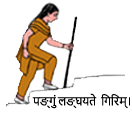Founded by Dr. Samuel Hahnemann (Germany) in the 1790s, homeopathy has a significant presence in India. For example, arthritis stands ninth amongst the ten most common conditions treated by homeopaths.
Homeopathy believes that a disease is intimately associated with an individual's life and results from internal concealed causes. Illness occurs only when resistance within the body is disturbed. Therefore, instead of organ systems, the entire person needs to be treated for an effective cure. Effects of drugs on various healthy individuals (Proving) are recorded in Materia-Medica (Repertory). A patient is assessed based on all symptoms, including psychological, and matched with a similar picture in the Materia-Medica. Finding the correct remedy is a challenge to the practitioner. Drugs used in small doses (dilution) are believed to stimulate self-healing and regulatory processes. These drugs work on the principle of 'like cures like.' The goal is to provoke vital force within the body to elevate body systems to a higher level and eliminate the disease. Therapy thus differs amongst patients of the same conventional diagnosis in classical homeopathy. 'Classical' homeopathy involves a detailed history and use of a single remedy, whereas 'clinical' homeopathy uses drug combinations. Avoidance of 'antidotes' such as coffee, mint, camphor, acupuncture, etc., is also essential. Concurrent use of modern drugs is usually discouraged based on principles of antidoting.
Prescription of remedies without a detailed assessment of an individual patient is called 'nonclassical' homeopathy. Bryonia, Apis, Pustallia, Rhux-tox, Kali-Carb, Colchicum, Ledam Pal, and Nat Mur are usually used to treat arthritis. Combination drugs are also available for ailments such as arthritis pain.
Although homeopathy claims success in treating autoimmune disorders, it is not generally advised in long-standing arthritis with damaged cartilage. Clinical studies are difficult due to the individualization of treatment in classical homeopathy and challenges in selecting drugs for an individual patient. Clinical research in Homeopathy is of low quality and hence unreliable. A double-blind prospective study of classical homeopathy treatment in rheumatoid arthritis showed significant improvement than placebo controls over three month period. This period is too short for a chronic disabling disease like rheumatoid arthritis. A recently published study has shown that clinical benefit in rheumatoid arthritis is due to the consultation process and is not a real effect of the drugs. Reduction in tender points and improved relief of pain were noted in a study of fibromyalgia. This disease has a significant psychological component. A meta-analysis of 4 studies (406 patients) on the use of homeopathy in osteoarthritis did not reveal any significant benefit.
Homeopathic therapy does not seem to have any significant side effects. The problem arises when patients start believing in some medicine that is not effective. Prescribing a placebo (inert pill) without informed consent from the patient is against medical ethics. No treatment should be continued beyond a certain period (say 3-6 months) if objective benefits are not evident.
